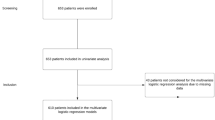Abstract
Clinical practice guidelines (CPG) have been shown to decrease practice variation, reduce resource use, and improve patient outcomes. The purpose of this study was to audit compliance of a pediatric complicated appendicitis CPG to identify areas for continued improvement. A comprehensive complicated appendicitis CPG was implemented in a children’s hospital system. Outcomes were compared for 48 months pre- (01/2012 to 12/2015) and 28 months post-implementation (01/2016 to 04/2018). A detailed compliance audit was nested within the post-implementation period in 60 consecutive patients from 11/2017 to 03/2018. Feedback was provided to care providers throughout the audit. Overall, 2370 children with complicated appendicitis were identified (1366 pre-CPG and 1004 post-CPG). The CPG resulted in decrease in mean length of stay from 5.3 days to 4.5 days (p = 0.751), postoperative returns to the system (13.0% to 10.1%, p = 0.030), and readmissions (5.3% to 4.3%, p = 0.237). Central line use decreased from 11.2% to 5.5% (p < 0.001) and antibiotic selection improved from 47.0% to 84.1% (p < 0.001). On audit, only 15% (9/60) had full CPG compliance and 49% (29/60) received recommended antibiotic durations. Compliance increased from 7% to 23% with audit-derived feedback. After stratifying by appendicitis severity, audits resulted in improved antibiotic duration compliance for patients with severe appendicitis (38.1% to 66.7%, p = 0.07) and postoperative ambulation for patients with lower grade disease (37.5% to 83.3%, p = 0.06). Audit cycles on a complicated appendicitis CPG and feedback to providers improved CPG compliance and more granular outcomes of interest.

Similar content being viewed by others
References
James, B. C., and Hammond, M. E., The challenge of variation in medical practice. Arch. Pathol. Lab. Med. 124(7):1001–1003, 2000.
Berwick, D. M., and Hackbarth, A. D., Eliminating waste in US health care. JAMA. 307(14):1513–1516, 2012.
Tian, Y., Heiss, K. F., Wulkan, M. L., and Raval, M. V., Assessment of variation in care and outcomes for pediatric appendicitis at children's and non-children's hospitals. J. Pediatr. Surg., 2015.
Gross, T. S., McCracken, C., Heiss, K. F., Wulkan, M. L., and Raval, M. V., The contribution of practice variation to length of stay for children with perforated appendicitis. J. Pediatr. Surg., 2016.
Muehlstedt, S. G., Pham, T. Q., and Schmeling, D. J., The management of pediatric appendicitis: A survey of north American pediatric surgeons. J. Pediatr. Surg. 39(6):875–879, 2004 discussion 875-879.
Rice-Townsend, S., Hall, M., Barnes, J. N., Lipsitz, S., and Rangel, S. J., Variation in risk-adjusted hospital readmission after treatment of appendicitis at 38 children's hospitals: An opportunity for collaborative quality improvement. Ann. Surg. 257(4):758–765, 2013.
Willis, Z. I., Duggan, E. M., Bucher, B. T. et al., Effect of a clinical practice guideline for pediatric complicated appendicitis. JAMA Surg. 151(5):e160194, 2016.
Slusher J, Bates CA, Johnson C, Williams C, Dasgupta R, von Allmen D. Standardization and improvement of care for pediatric patients with perforated appendicitis. J. Pediatr. Surg. 2014;49(6):1020–1024; discussion 1024-1025.
Fraser, J. D., Aguayo, P., Leys, C. M. et al., A complete course of intravenous antibiotics vs a combination of intravenous and oral antibiotics for perforated appendicitis in children: A prospective. randomized trial. J Pediatr Surg. 45(6):1198–1202, 2010.
Fallon, S. C., Brandt, M. L., Hassan, S. F., Wesson, D. E., Rodriguez, J. R., and Lopez, M. E., Evaluating the effectiveness of a discharge protocol for children with advanced appendicitis. J Surg Res. 184(1):347–351, 2013.
Partain, K. N., Patel, A. U., Travers, C. et al., Improving ultrasound for appendicitis through standardized reporting of secondary signs. J Pediatr Surg. 52(8):1273–1279, 2017.
Baxter, K. J., Short, H. L., Travers, C. D., Heiss, K. F., and Raval, M. V., Implementing a surgeon-reported categorization of pediatric appendicitis severity. Pediatr. Surg Int. 2018.
Cook, D., Thompson, J. E., Habermann, E. B. et al., From 'solution shop' model to 'focused factory' in hospital surgery: Increasing care value and predictability. Heal. Aff. (Millwood). 33(5):746–755, 2014.
Robinson, J. R., Avritscher, E. B., and Gay, J. C., et al., Measuring the value of a clinical practice guideline for children with perforated appendicitis. Ann. Surg. 2016.
Acknowledgements
The authors would like to thank the multidisciplinary QI team at Children’s Hospital of Atlanta for their assistance on this project and to the surgeons in the Division of Pediatric Surgery for participating in the QI process.
Funding
This study was funded in part using and internal Children’s Healthcare of Atlanta Quality Improvement Award.
Author information
Authors and Affiliations
Contributions
Raval: concept development, study design, data collection, drafting manuscript, critical revision of manuscript.
Kwan: study design, data collection, critical revision of manuscript.
Travers: study design, data analysis, creating tables, critical revision of manuscript.
Heiss: concept development, study design, critical revision of manuscript.
Corresponding author
Ethics declarations
Declaration of Interest
The authors reports no proprietary or commercial interest in any product mentioned or concept discussed in this article.
Conflict of Interest
Mehul V. Raval declares that he has no conflict of interest.
Alan B. Kwan declares that he has no conflict of interest.
Curtis D. Travers declares that he has no conflict of interest.
Kurt F. Heiss declares that he has no conflict of interest.
Research Involving Human Participants and/or Animals
Ethical Approval: All procedures performed in studies involving human participants were in accordance with the ethical standards of the institutional and/or national research committee and with the 1964 Helsinki declaration and its later amendments or comparable ethical standards. Approval was obtained from the Emory University Internal Review Board (#00077519) before the retrospective data review.
Informed Consent
Not applicable based on the retrospective nature of the study.
Additional information
This article is part of the Topical Collection on Systems-Level Quality Improvement
Rights and permissions
About this article
Cite this article
Raval, M.V., Kwan, A.B., Travers, C.D. et al. Importance of Compliance Audits for a Pediatric Complicated Appendicitis Clinical Practice Guideline. J Med Syst 42, 257 (2018). https://doi.org/10.1007/s10916-018-1117-0
Received:
Accepted:
Published:
DOI: https://doi.org/10.1007/s10916-018-1117-0




